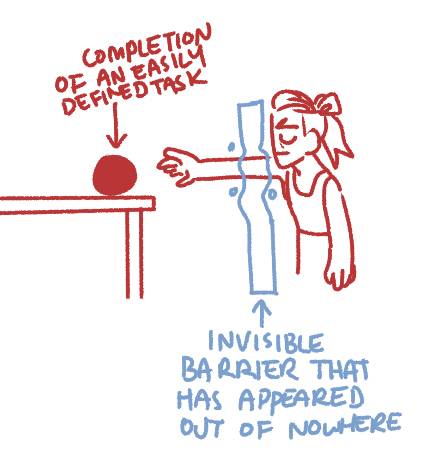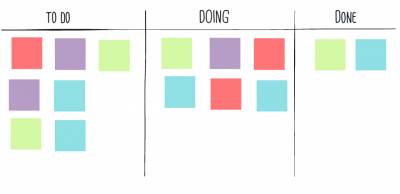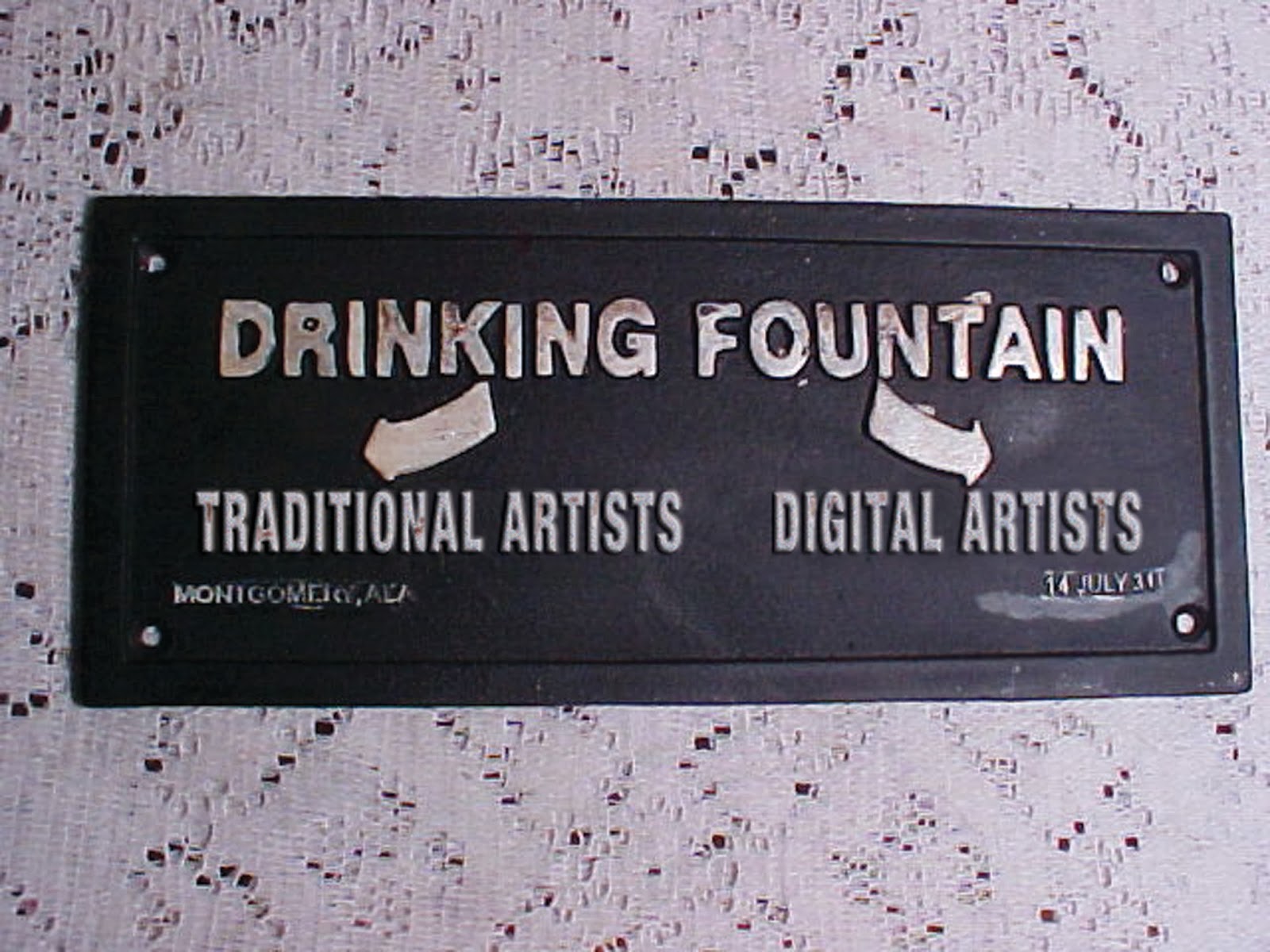Some months I know exactly what I want to write for Muddy Colors. I’ve written notes down, collected reference & research, and maybe even started writing before the day it’s due.
But MOST of the time, I procrastinate until the last minute. This is one of those months. But that doesn’t mean I haven’t been productive. In fact, I am incredibly productive when I am procrastinating! When I have something important to do with a looming deadline my brain will go to anything else and become hyper-focused. On literally anything but what is due first. I thought this was a weird quirk of mine, a way I maybe managed to be both a super-productive creator of things (bookcovers, side projects, blog posts) and yet still be a terrible procrastinator. And then I saw this quick comic on twitter by Ira Prince:
Uh yea, that’s me exactly. From as far back as I can remember I would have to clean my room before sitting down and doing homework. Today my brain will work on anything else but the thing on deadline, until I pass some arbitrary feeling time limit and finally OMG IT’S DEADLINE TIME and I’ll be free to focus on the thing I have to do.
But really, wouldn’t it be easier if I could have started the thing on deadline earlier?
Under the comic above, there was discussion about whether this was a symptom of something like ADD or ADHD. And I don’t think so. I have never been diagnosed with them, and none of the symptoms fit…I think this is a separate phenomenon. And I got curious about it.
“. . . anyone can do any amount of work, provided it isn’t the work he is supposed to be doing at that moment.”
—Robert Benchley
Turns out, I am far from the first person to deal with procrastination this way…there is something called “Structured Procrastination“, a term coined by John Perry, who wrote The Art of Procrastination:
All procrastinators put off things they have to do. Structured procrastination is the art of making this bad trait work for you. The key idea is that procrastinating does not mean doing absolutely nothing. Procrastinators seldom do absolutely nothing; they do marginally useful things, like gardening or sharpening pencils or making a diagram of how they will reorganize their files when they get around to it. Why does the procrastinator do these things? Because they are a way of not doing something more important. If all the procrastinator had left to do was to sharpen some pencils, no force on earth could get him do it. However, the procrastinator can be motivated to do difficult, timely and important tasks, as long as these tasks are a way of not doing something more important.
Yup, sounds familiar.
The fascinating thing is that instead of trying to avoid procrastinating, Perry leans into it:
Procrastinators often follow exactly the wrong tack. They try to minimize their commitments, assuming that if they have only a few things to do, they will quit procrastinating and get them done. But this goes contrary to the basic nature of the procrastinator and destroys his most important source of motivation. The few tasks on his list will be by definition the most important, and the only way to avoid doing them will be to do nothing…
Structured procrastination means shaping the structure of the tasks one has to do in a way that exploits this fact. The list of tasks one has in mind will be ordered by importance. Tasks that seem most urgent and important are on top. But there are also worthwhile tasks to perform lower down on the list. Doing these tasks becomes a way of not doing the things higher up on the list. With this sort of appropriate task structure, the procrastinator becomes a useful citizen. Indeed, the procrastinator can even acquire, as I have, a reputation for getting a lot done.
Now, Perry’s writing has a healthy dose of self-depreciating humor in it, but he’s also onto something. When I started working at Orbit, I pretty much had to build an art department from the ground up. It was such a major leap from my previous position (Art Director at Doubleday) that I not only had 10x the to-dos, I was so swamped that just keeping tabs on all the to-dos was a full time job, forget doing them. Yet, I was still a procrastinator, and faced with that much I was utterly overwhelmed. Luckily I found Leo Babuata’s Zenhabits blog and Zen to Done system. It’s just one of a number of ways to keep track of to-do lists. Kanban is another simple one. Sometimes it helps to make an “Emotional To-Do List” and figure out what you’re avoiding. (Warning, this is a rabbit hole, and if you get really into it, you’ll end up in comparing Agile workflows and never get anything done.) I prefer physical post-it notes and pens, but there’s also a ton of to-do apps that you can use instead.
Whether you do it physically or digitally, you need to be able to make visual lists that can be reordered and moved around easily.
Then you make sure everything you have to do is written down. Be an artist, get creative. Color-coding really helps here. I’d show you the post-it note layout I have going at any given moment, but there’s too much NDA and not-launched-yet projects and I don’t want to get fired, sorry. Just trust me when I say I use every color of post-it note.
Now that you have everything you need to do written down, and the tasks are prioritized (usually by due date), then you can figure out what procrastination level you are at. When you are stuck in the quicksand trap of not being able to even think about the most critical to-dos on your list, maybe you just need to bang out a couple easy tasks from further down the list to build some momentum. (And dopamine, because crossing out an item on your to-do list literally feels good.) Do some laundry. Go to the gym. Do some paperwork. Then come back and use the momentum to stick your toe into one of the big scary to-dos. I find that I can easily bang out a few less-time sensitive tasks much easier in the morning as a warm-up. Then I can tackle a big one right before lunch, then reward myself with a lunch break. Then I usually need a few little things to get past the food coma. Then as the work day starts to wind towards 4, I can tackle one or two of those things that were due by end of the day.
A while back (holy crap, way back in 2014), I wrote an article on this blog called “The Four Reasons You (and I) Don’t Get Shit Done” and the point of that article was that we’re not procrastinating because we’re lazy. We’re procrastinating because something emotional is getting in the way. Often times it’s fear. Sometimes it’s shame. Whatever it is, sometimes you just can’t force your head through the wall. Sometimes it’s easier to take the pressure off by completing smaller tasks around the big scary one until that one starts breaking up into bite-size chunks. But if you can do that, then you’ll find out you’re way more productive than you used to be.
“Procrastination is not a time-management problem, it’s an emotion-management problem,” —Tim Pychyl, The Procrastination Research Group











You are describing me Lauren. In my case it is just fear of not creating with the quality I have in my mind. I have always wondered if Velázquez suffered the same symphtoms: “No, these Meninas I am painting aren’t as good as Ruben’s 3 Graces, let’s go and draw a diagram on how to order my brushes by sizes”
I am 10000% sure he did.
amazing post Lauren! Thanks for all the resources. down the rabbit hole I go. Goodbye dino, goooddbyyyeee
haha you’re welcome! that zen habits blog alone is a gold mine!
Oh yes… sometimes I am deep into a cleaning and organizing frenzy before I realize that I’m doing it to procrastinate about something. I just started listening to a podcast that I’m finding pretty insightful because it’s all about thought work and using cognitive psychology to overcome all sorts of problems. It’s called “Unf*ck Your Brain.” The first episode I listened to was called How to Stop Procrastinating (it’s way at the bottom of the feed, from back when the show’s original incarnation was more targeted to lawyers). Kara, the host, says that when you procrastinate, it’s because your lizard brain perceives something about the task as a threat. Maybe you don’t know how to do it, or you’re afraid you’ll get negative feedback. So you avoid it up the point where the deadline becomes a bigger threat than the task was, then your lizard brain allows you to move forward in order to avoid the bigger threat of missing the deadline or whatever it is. She talks about digging into what the thinking and emotion is that’s causing the procrastination, then replacing those negative thoughts and fears with more positive or at least neutral thoughts. It’s really interesting and something I need to practice!
Yes that’s exactly it! The fear of the deadline has to overcome the fear of doing the thing in the first place.
My neurosis has a name. haha! Thank you Lauren!
<3